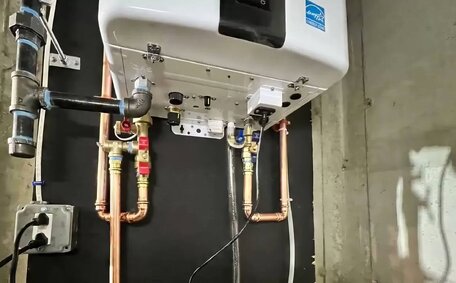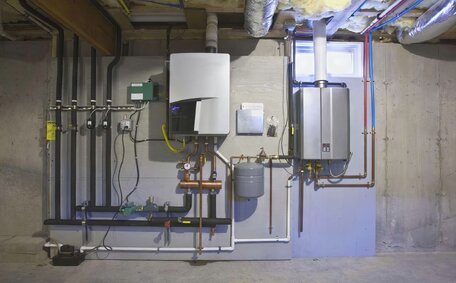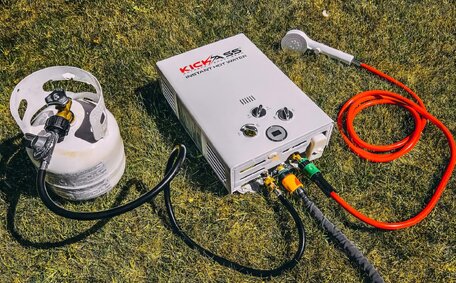Understanding Solar Hot Water Systems
In Croydon Park, solar water heaters are becoming increasingly embraced for their ability to cut energy costs and minimise eco-footprints. These systems capture and store the sun’s energy, providing households with a sustainable hot water solution.
Homeowners have two main options in solar hot water technology: evacuated tube and flat plate collectors. These systems exploit solar energy to heat water efficiently, resulting in notable cost savings over time.
Solar panels designed for solar water heating are commonly installed on rooftops, with the system’s operation involving the circulation of cold water through these panels, where solar energy heats water, which is then conveyed to the storage tank once the system is installed.
Investing in a solar hot water system for your home can yield significant savings on utility bills compared to traditional models. This exploration of solar solutions outlines their financial and eco-friendliness benefits, factoring in climate, installation costs, household usage, and other pertinent considerations.
How Solar Hot Water Systems Work
Solar hot water systems, utilising solar panels to capture the sun’s warmth, are more energy-efficient than traditional systems and can lead to reduced household energy consumption. There are two main types of solar panel collectors:
- Flat plate collectors - These are boxes with glass covers that contain copper pipes or tubes with water running through them. The panels capture the sun’s rays, which in turn raises the temperature of the water in the pipes.
- Evacuated tube collectors - These consist of rows of glass tubes, each containing a glass inner tube connected to a copper heat pipe. The sun’s energy heats up the copper pipe, causing liquid inside it to turn to vapour. This vapour ascends, thereby converting solar energy into heat energy inside the tube, which directly heats the water contained within a storage tank.
In both systems, pumps circulate your hot water through the collectors and to an insulated storage tank, which can effectively maintain the heated water’s temperature. Here, the heated water is held in water storage, remaining on standby, ready for daily activities such as showering, doing laundry, washing dishes and more, ensuring a reliable source of hot water per day. The water tank also has an electric or gas booster, and can incorporate a heat pump to ensure a consistent supply of hot water even during overcast conditions.
A suitably sized solar hot water system can provide between 60-90% of a household’s hot water needs through renewable energy, boasting high energy efficiency. Even in less sunny locales across Australia, with optimal collector positioning, these systems are financially prudent.
Types of Solar Hot Water Systems
Consumers researching the price of a system will find there are a few main types of solar hot water systems available, showcasing the versatility solar technology offers:
Active vs Passive Systems
Active solar hot water systems use pumps to circulate water or a heat transfer fluid, ensuring efficient flow between panels and the storage tank. Conversely, passive systems depend on gravity and the natural thermosyphon process, avoiding the need for mechanical pumps.
- Despite their higher efficiency, active systems come with increased upfront costs because of necessary extra pumps and controllers.
- Passive systems, noted for their efficiency, have no moving parts resulting in lower maintenance requirements. However they usually need to be installed at optimal angles to aid thermosyphon circulation.
Direct vs Indirect Circulation
Direct circulation solar water heaters feed potable water directly through the collectors. Indirect circulation systems use a heat exchange fluid like glycol in the collectors, to transfer heat to water in the storage tank.
- Direct circulation systems are simpler and cheaper, but can lead to scale build-up in pipes from hard water which may affect system efficiency.
- Indirect systems can also prevent scaling and overheating, but are more complex and expensive to install.
Split Systems
Split system solar hot water systems have separate collector panels and storage tanks connected by pipework. This allows optimal placement of each component.
Prior to selection, evaluate your roof area, space for tank installation, water usage, and climate to identify the solar hot water system that satisfies your requirements and maximises long-term monetary benefits.
Flat Plate vs Evacuated Tube Collectors
Solar hot water systems exploit two primary types of collectors: flat plate and evacuated tube, each with its unique strengths and operational differences.
Flat Plate Collectors
Flat plate collectors are sealed, insulated enclosures with a transparent glass or polymer top. They can be rectangular boxes or panels made to fit on pitched roofs. As sunlight hits the collector, the water inside the pipes gets heated.
Inside are copper pipes through which water circulates.
Advantages:
- Simple in design and do not overheat.
- Lower cost to purchase and install.
- Last 15-20 years with minimal maintenance.
Challenges:
- Their efficiency drops in colder conditions.
- They require a larger area for efficient solar energy capture.
Evacuated Tube Collectors
Evacuated tube collectors are made of parallel rows of glass tubes. Inside each tube is a metal fin attached to a copper heat pipe, from which the air has been removed or ‘evacuated’. This vacuum stops conductive heat loss.
As sunlight strikes the tubes, it heats the copper pipe causing liquid inside to turn to vapour and transfer heat to water in the connecting manifold and storage tank.
Advantages:
- Very efficient technology due to the vacuum insulation.
- They are suitable for use in cooler climates.
- Demands less roof area.
Challenges:
- They come with a higher initial purchase and installation expense.
- Can be prone to damage in severe hailstorms.
- Heat pipes may need replacing over time.
In Croydon Park’s typically sunny climate, a flat plate system often meets most home’s needs. However, for year-round reliability, an appropriately sized and oriented evacuated tube system is recommended.
Costs of Installing Solar Hot Water
In Croydon Park, you can expect to invest between $4,000 and $7,000 for a solar hot water system, with prices varying based on the type and size selected.
Significant costs involve the purchase of solar components:
- Solar collector panels suitable for different configurations - $1,500 - $3,500
- Storage tanks, which can cost around $800 - $2,000
- Material costs to install solar mounting frames, pipes and insulation - $500 - $1,200
- Electric or gas booster - $200 - $600
- Labour and installation - $1,000 - $2,500
The operating costs of solar water heaters are impressively low, harnessing the sun’s free energy for most water heating needs. Additionally, their maintenance expenses are minor when contrasted with traditional systems.
The overall return on investment depends on factors like how much your existing water heating costs, household usage, climate and orientation. But in general, most solar hot water systems can pay for themselves within 4-8 years.
The Australian Government offers rebates through the Small-scale Renewable Energy Scheme (SRES) that can alleviate the cost of installing solar systems by $500-$1000 or more if household eligibility criteria are met.
Get in touch with Croydon Park Plumbing to assess if solar hot water is suitable for you, and leverage SRES rebates to save money and ensure the swiftest payback.
Expected Long-Term Savings
Installing a correctly sized solar water heater can lead to considerable long-term savings on energy bills. By harnessing solar power with a PV system to provide renewable heat, these systems usually reduce your water heating expenses by 50-65%.
A typical Croydon Park household switching from an electric heater to a solar system with boosters can save around 60% on water heating costs. This equates to over $300 per year that can stay in your pocket rather than going to electricity providers.
Cumulative savings over 15 years could exceed $5,000 in avoided energy costs. And with energy prices constantly rising, the value your home may increase while your long-term savings may end up even higher, all while enjoying endless free solar hot water.
Besides curbing water heating costs, elevating to a solar hot water system can enhance the value your property significantly, adding to the overall worth and appeal of your home. There is increasing demand for sustainable, energy efficient homes which solar hot water helps achieve.
Payback Period
The payback period is how long it takes for the money saved on energy bills to cover the upfront cost solar hot water system installation. In Croydon Park, most good quality systems can pay for themselves within 4-8 years through lower electricity and gas bills.
If you replace an electric water heater that costs $300 a year to operate with a $5,000 solar system, you could save 60% or $180 annually. This means you’d recoup the initial cost in approximately 7 years through annual savings (5,000 / 180 = ~7 years).
Given a lifespan of 15-20 years, a solar hot water system will continue saving money long after the payback period. When factored over an entire lifespan, a solar hot water system can last and continue to accrue savings that exceed $7,500 in avoided energy bills compared to conventional water heating.
With fossil fuel energy prices constantly rising, the financial savings and payback period of solar hot water will become even more appealing over the years ahead.
Environmental Benefits
Solar hot water systems are stellar in reducing greenhouse gas emissions, deterring over 3 tonnes of carbon dioxide per household annually in comparison to traditional electric water heating.
Utilising solar power rather than fossil fuels, solar hot water systems substantially trim your home’s carbon footprint, equating to removing more than 2 cars from the roads each year.
In addition to curbing emissions, solar thermal techniques diminish the burden on non-renewable resources, thereby increasing the environmental value of your setup. Widespread adoption would support Australian and global climate change targets while moving towards a more sustainable future.
Solar hot water works silently as well, with no noise pollution. And when installed on your Croydon Park home, it increases the property’s environmental credentials which appeals to eco-conscious buyers.
With environmental aspects like these, the benefits solar technology provides, such as solar hot water tick all the boxes - saving money on bills, adding value to your home, and benefiting the planet at the same time!
Factors to Consider Before Switching
Upgrading to a solar hot water system necessitates a detailed appraisal of your home and hot water consumption. Evaluate these crucial factors before transitioning from conventional water heating in Croydon Park:
Roof Space and Orientation
Your roof needs adequate unshaded north-facing space for the solar collectors to maximise exposure. Installing evacuated tube systems can compensate for less ideal roof aspects.
Local Climate Conditions
Croydon Park receives abundant sunlight to make solar thermal systems highly effective. Payback periods for the solar hot water system your home might benefit from are shorter in sunnier locations.
Daily Hot Water Usage
Assess your household’s peak and off-peak hot water needs to make an informed decision about switching to solar hot water. Solar hot water systems are sized to meet 50-80% of general demand to remain cost-effective.
Building Regulations
Consider safety regulations, council planning rules, strata title by-laws etc regarding external structures when installing collectors.
System Types and Costs
In the process of getting a system installed, seek quotes from Croydon Park plumbers to compare different types of solar hot water systems. Compare types of collectors, tanks, boosters etc and calculate potential savings against costs to determine payback.
Carefully weighing up these key factors will determine if and what type of solar hot water system makes the best financial and environmental choice for heating water in your Croydon Park home.
Choosing the Right System
Selecting the optimal solar hot water system for your Croydon Park home depends on several key factors. Carefully analyse your roof space, orientation, hot water usage, climate conditions and budget when deciding between types of systems and components.
Typically, a single flat plate collector with a gas boosted storage tank suits the needs and climate of most Croydon Park households. But evacuated tube systems may provide advantages if you have high usage, limited roof space or want to maximise efficiency.
Get professional advice from accredited Croydon Park plumbers. They can assess your heating needs, model potential bill savings across different systems, and help you take advantage of government rebates. This ensures you choose the most cost-effective system design and size for sustainable, renewable hot water heating for years to come.
Maximizing Value and Efficiency
For optimal value and performance from your solar hot water system in Croydon Park, heed these suggestions:
- Ensure your system is correctly sized to meet 50-80% of your hot water needs for optimal cost and efficiency. Oversized systems may not align with your water needs, tending to be more expensive and underused.
- Carry out annual inspections and maintenance checks to keep your system operating at peak performance.
- Invest in a timer control so you can match hot water usage to solar heating times for maximum self-sufficiency.
- Add a gas or electric booster heater to provide sufficient hot water on cold overcast days when solar gain is limited.
- Keep collector panels clean, clear of shadows and tilted at the optimal angle to maximise solar absorption year-round.
The qualified plumbers at Croydon Park Plumbing can guide you through renewable solar system considerations and features to help maximise the value and efficiency of your solar hot water.






